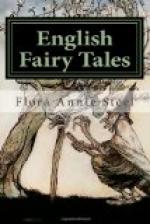Then she said to the child, “I must take the tangles out of your hair before you go to sleep. Come, put your head on my lap.”
So the little girl put her head on her stepmother’s lap, and, lo and behold! her beautiful yellow-silk hair rolled right over the woman’s knees and lay upon the ground.
Then the beauty of it made the stepmother more jealous than before, so she said, “I cannot part your hair properly on my knee, fetch me a billet of wood.”
So the little girl fetched one. Then said the stepmother, “Your hair is so thick I cannot part it with a comb; fetch me an axe!”
So the child fetched an axe.
“Now,” said that wicked, wicked woman, “lay your head down on the billet while I part your hair.”
And the child did as she was bid without fear; and lo! the beautiful little golden head was off in a second, by one blow of the axe.
Now the wicked stepmother had thought it all out before, so she took the poor little dead girl out to the garden, dug a hollow in the snow under the rose tree, and said to herself, “When spring comes and the snow melts if people find her bones, they will say she lost her way and fell asleep in the snow.”
But first, because she was a wicked witch-woman, knowing spells and charms, she took out the heart of the little girl and made it into two savoury pasties, one for her husband’s breakfast and one for the little boy’s, for thus would the love they bore to the little girl become hers. Nevertheless, she was mistaken, for when morning came and the little child could not be found, the father sent away his breakfast barely tasted, and the little boy wept so that he could eat nothing.
So they grieved and grieved. And when the snow melted and they found the bones of the poor child, they said, “She must have lost her way that dark night going to the grocer’s to buy candles.” So they buried the bones under the children’s rose tree, and every day the little boy sate there and wept and wept for his lost playmate.
Now when summer came the wild rose tree flowered. It was covered with white roses, and amongst the flowers there sate a beautiful white bird. And it sang and sang and sang like an angel out of heaven; but what it sang the little boy could never make out, for he could hardly see for weeping, hardly hear for sobbing.
So at last the beautiful white bird unfolded its broad white wings and flew to a cobbler’s shop, where a myrtle bush hung over the man and his last, on which he was making a dainty little pair of rose-red shoes. Then it perched on a bough and sang ever so sweetly:
“Stepmother slew me,
Father nigh ate me,
He whom I dearly love
Sits below, I sing above,
Stick! Stock! Stone dead!”
“Sing that beautiful song again,” said the cobbler. “It is better than a nightingale’s.”
“That will I gladly,” sang the bird, “if you will give me the little rose-red shoes you are making.”




